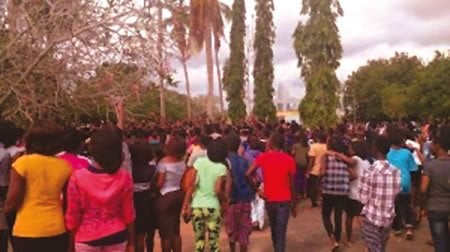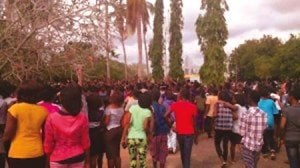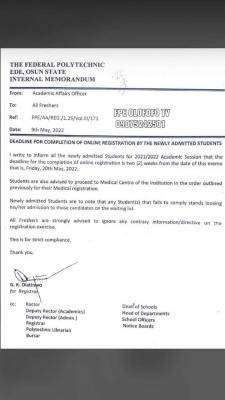
Student unrest is as old as university education in Nigeria, but there has been little or no recorded protest or agitation in the privately owned universities, which, many say, are in business to give their state-run counterparts a run for their money.

Bowen Students During Protest
Indeed, many stakeholders hold the view that the coming of the private institutions is to teach the state-run ones how to manage effectively their schools in terms of providing the right learning environment.
However, this incentive, as it were, does come at a price. The fees in such institutions are usually prohibitive. In fact, whether primary, secondary or tertiary institution, such schools are not financially comfortable places for the poor or anyone struggling with finances to send his children or wards to for schooling. Indeed, the tuition in a private tertiary institution in the country ranges between N500, 000 and N2m per academic session.
With this, the expectation of parents and their children are high with regard to the provision of infrastructure and other learning conditions.
Similar Posts:
Besides, many stakeholders see these privately owned schools, otherwise called elitist institutions, as real training ground for character moulding and learning.
Little wonder, the violent protest by the students of the Bowen University, Iwo, Osun State, an institution run by the Nigeria Baptist Convention last week, came to many as a shock. The students protested against the lack of electricity supply to some hostels on campus and by the last count, no fewer than 20 cars have been vandalised.
The protesting students also destroyed the school property worth millions of Naira, just as they allegedly looted business premises and shops. In fact, the degree of violence unleashed on campus on Wednesday night prevented pupils of a nearby primary school from attending school the next day.
Broken louvres, bottles and other dangerous items littered every nook and cranny of the school.
A student, who told our correspondent that the protest started about 9pm, blamed the lack of electricity supply to a new male hostel for the action. According to him, the lack of electricity prevented many of the football-loving students from watching a UEFA Champions League match between Manchester United and Olympiakos.
He said, “The university management just released a new timetable, directing us to leave the hostels by 8am and stay at the school area until 4pm. Also, the new male hostel does not have water or electricity supply and this has forced male students to stay back to charge their phones at the cafeteria and anywhere they have access to electricity. But on Wednesday night, they were disappointed because some of them could not watch the Manchester United match. A few students started it and before we knew what was happening, they had recruited many of us to join the aluta.”
But a female student, who simply identified herself as Seun, gave another version to the crisis, saying the university authorities were treating them like toddlers who needed to be told when to eat and sleep.
The school’s Public Relations Officer, Mr. Gboyega Aderoju, however, dismissed these claims.
Giving an insight into what allegedly led to the protest, he said, “They were protesting an electricity fault on one of the floors in a hostel. They were watching football match when this happened and they then trooped out to protest. A few of them started it and forced others to join in the protest.”
Aderoju, who expressed surprise at the level of destruction, also confirmed the arrest of no fewer than 10 students for the crisis.
Commenting on the protest at BU, the chairman of the Academic Staff Union of Universities. Obafemi Awolowo University, Prof. Akinola Adegbola, said the students ought to have respected the school’s rules and regulations.
He said, “I believe that students knew before they were admitted that there were many rules they must abide with. But the lack of electricity supply and water should be improved upon because parents who sent their children to a private university must have envisaged that there would be electricity supply whether from the government facilities or from generator.
“The lack of infrastructure, which has killed many businesses in the country, has also started eating into the privately owned universities.”
However, the ASUU, Ilorin zone Chairman, Dr. Adeleke Ayan, said the protesting students reacted violently because they had bottled up resentments against the many rules forced on them in the university.
He said, “Some of us knew that these students would soon react like this, but we did not expect it to escalate into a crisis. The students are adults, but they are being treated like toddlers.
“You can imagine a student, who attended a public secondary school before coming to a private university; a student who had some degree of freedom suddenly finds himself in such an environment.
“Also, if you pay as high as they are being charged, you should expect some degree of comfort. Normally, the students would ask questions such as why would authorities charge exorbitant fees when they could not supply some basic amenities. So, the protest didn’t come as a surprise.”
A lecturer at the Ladoke Akintola University of Technology, Ogbomoso, Dr. Debo Ishola, said the authorities should make sure that the students enjoy basic infrastructure.
Ishola, who teaches Physics, said the failure to do this would continue to trigger protests because the students knew how much they paid and would expect to enjoy some basic amenities.
Appraising the development, a lecturer in one of the public universities, who craved anonymity, said it appeared as if many of the nation’s private universities accommodated expelled students from the state-run universities.
Meanwhile, the BU Vice-Chancellor, Prof. Mathew Ojo, has promised a thorough investigation into the crisis, declaring that the school would have no place for the culpable students.
A similar protest occurred at the Ajayi Crowther University run, by the church of Nigeria, Anglican Communion, last year. The students protested the death of their colleague who they alleged died due to the insensitivity of university authorities. (Punch)



